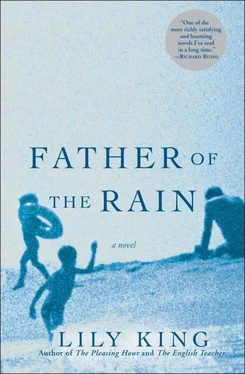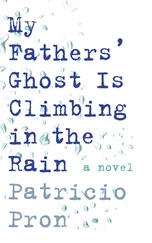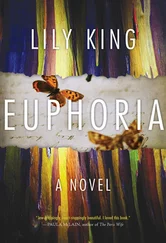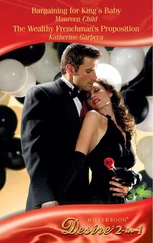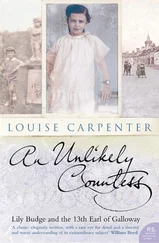“I don’t want to do anything to ruin what we have.”
What do they have? What could they possibly have built in five days? “You won’t.” I touch the white wool of her sweater. “You won’t.”
For the rest of the week there’s no more mention — in front of me, anyway — of the birthday party.
On Saturday my father’s team has a game in Allencaster. He won’t be back until six, he tells me.
At four, Barbara comes down in a navy blue dress and navy blue pumps. Above her left breast she has fastened a pin in the shape of a teddy bear. The gold plate has rubbed off of its feet and face. “Hatch gave this to me for Christmas when he was five years old. His father let him pick out anything in the store, and this is what he picked.” Her eyes fill and she speaks loudly, as if to stop the tears. “That was thirty years ago. Oh, Daley, I hope I’m doing the right thing.”
“What did Dad say before he left this afternoon?”
“He didn’t say anything.”
“Did you tell him you were going?”
“I was afraid to.” Worry settles over her.
“I’ll explain it to him. You go.”
She smiles uneasily. “Thank you, Daley. I won’t stay long. Just through dinner. Then I’ll leave the ball like Cinderella.”
Her analogy makes me even more certain she won’t want to come back.
When my father comes home he’s keyed up. His team won by twenty-six points. “You should have seen the last play. Unbelievable. Those kids were on fire today.” He looks around. “Barbara out getting dinner?”
I can’t tell if he’s faking it.
“It’s Hatch’s birthday.”
“What?” But it’s not a question. I always thought he had to be drunk to speak with such pure bile.
“Dad, she has a family.”
He sticks a finger, the one with the pencil lead stuck in the knuckle, out at me. “She knows exactly how I felt about this. Don’t defend her.”
“All right,” I say. It’s her battle, not mine. Better she learn earlier, rather than later, the kind of sacrifices my father requires.
He goes to his meeting and then eats dinner in front of the game. It was supposed to snow tonight but it’s raining instead, a hard cold rain that pelts against the windows in the den. I go to bed early, hoping to sleep through the night.
I wake up past midnight to banging and go out into the hallway. All the lights are out, my father’s bedroom door ajar, like it used to be before Barbara moved in. I can’t hear him snoring. The banging is coming from the kitchen. I go down the back stairs quietly, keeping all the lights off.
Barbara is on the porch, both hands pounding against the panes of the back door.
“Daley!” I hear her cry out in relief. “Daley.” She rests her forehead on the glass.
I haven’t made it halfway across the kitchen to her when I hear my father hiss, “You let her in and I put you both out.”
I can just barely make out the outline of him in his pajama bottoms, fists clenched, hovering in the doorway of the pantry where she can’t see him.
“Jesus Christ, Dad,” I say, and keep moving. Barbara is pressed against the door, crying, the teddy bear brooch clanking against the glass. Behind her are her two hardshell suitcases, getting soaked in the rain. My father must have put them out there before he locked the door.
I reach the doorknob. It is cold. Mrs. Bridgeton moans, “Oh, Daley,” and I start to turn it and she screams and then my grip is not enough. I am smashed against the wall: head, shoulder, hip. And then I’m on the floor. My whole left side aches, the shoulder wrenched. There’s no one through the glass of the door anymore. It’s possible I’ve been unconscious.
I notice my father, crouched beside me. “You okay there?”
I nod.
“You sure?”
I nod again.
He helps me upstairs. He pulls down the covers so I can get into bed. He sits beside me, near my knees. My ear is throbbing. My shoulder is on fire. I don’t want him to know this. I can smell his humid metallic nighttime smell from childhood. I can smell it now, the exact same smell, coming off of him like a steam.
He pats my thigh through the covers. “Well, we dodged that bullet,” he says.
“Good night, Dad,” I say evenly. It’s important to give the impression of calm.
He doesn’t move. He strokes my thigh. I shut my eyes and, after a few minutes, make my breathing heavier. He gets up then and goes down the hallway to his room.
I wait. I keep waiting. Physical pain is a relief at this point. It blots out everything else. His first snores are weak and uneven. Soon they even out to the steady thrum you can hear all over the house.
It doesn’t take long to put all my stuff in garbage bags. It hurts and I have to carry them one at a time with my left arm to the car, but it’s all done in half an hour.
Barbara’s suitcases are still on the porch, but her car is gone.
I pass through the kitchen with my last bag. I look at the kitchen table. I have no note for him.
My daughter is speaking in an English accent, which means she is either a queen or the head of an orphanage.
“You must try to look people in the eye when they speak to you,” she says imperiously to her little brother. “They only mean well.” She has heard that from me, the encouragement to make eye contact. It’s like listening in on their dreams; tiny fragments of their lives are stitched carefully into the story.
“Not witches. Green-faced witches don’t mean well,” Jeremy says. It’s been a few years, but he still hasn’t recovered from seeing The Wizard of Oz at his grandmother’s house.
“Not always. But people do.”
“Yes.”
“M’lady,” she whispers.
“Yes, m’lady.”
They clatter through the kitchen solemnly, Lena wearing my high-heeled sandals and black wool skirt as a cape, Jeremy with an elaborate duct tape belt and a walking stick from the yard. I’m not allowed to acknowledge them.
The phone rings, and a formal voice asks for Daley Amory.
“Speaking.” I wait for the sales pitch. But there is a long pause instead.
“It’s Hatch. Hatch Bridgeton.” He says his name like it is a small joke between us.
“Oh.” My father must be dead.
The children, sensitive to my tones of voice, stop their game.
“Your dad had a stroke. A big one. They can’t stabilize him.”
I got an invitation to Hatch’s wedding and, six years later, a group email about his divorce. I sent my regrets and a ceramic bowl for the wedding, and a short but I hoped sympathetic reply to the email. Other than that, I’ve had no contact with him in all the years that we’ve been stepbrother and sister.
“Are you there now?” I ask.
“I am. But I’m flying home tomorrow. I’ve been here a week and things are falling apart at work.”
“A week?”
I can feel him struggle for a way to explain the seven days between my father’s stroke and this phone call. But I know he’s just been following instructions. “I left a message for Garvey, too. They don’t think he’ll make it through the weekend.”
“I’m not sure,” I say.
“I understand. Scott and Carly are sitting this one out, too.”
In my mind, Carly and Scott are still skipping stones on their beach in Ashing on Thanksgiving Day. But life has lurched on for them, as it has for us all.
In the fifteen years since I last saw my father, I have spoken to him once. It was the night the Red Sox won the Series and broke the curse. I knew he’d be up. I didn’t think about it. I just dialed the number. Barbara answered and I surprised her. She didn’t know what tone to use with me. She told me to hang on and covered the phone. I could hear him refuse, and Barbara insist. I felt her try to seal the holes of the phone’s receiver more securely, heard his voice rising and snapping, and then a sudden, “Hello there,” fake, and drunk as hell.
Читать дальше
